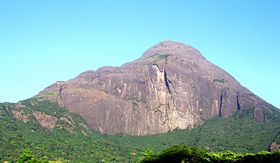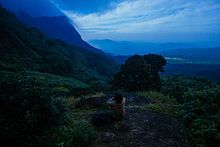
The South Western Ghats moist deciduous forests is an ecoregion in the Western Ghats of southern India with tropical and subtropical moist broadleaf forests. This biome covers the Nilgiri Hills between elevation of 250 and 1,000 m in Kerala, Karnataka and Tamil Nadu states.

Ponmudi is a hill station in the Peringamala gramapanchayath of Trivandrum District of Kerala in India. It is located 22km west of Vithura town, 53 km north-east of Trivandrum City, 78 km south-east of Varkala town and 69 km north-east of Kovalam Beach at an altitude of 1,100 m (3,600 ft). Ponmudi (Varayadumotta) peak is a part of the Western Ghats mountain range that runs parallel to the Arabian Sea. Ponmudi is a popular honeymoon destination in South India. The normal temperature of Ponmudi is between 18 and 25 °C.

Kallidaikurichi or Kalladaikurichi is a town on the right bank of the Thamiraparani river in Ambasamudram Taluk of Tirunelveli district in Tamil Nadu, a southern state of India.

The Thamirabarani or Tamraparni or Porunai is a perennial river that originates from the Agastyarkoodam peak of Pothigai hills of the Western Ghats, above Papanasam in the Ambasamudram taluk. It flows through Tirunelveli and Thoothukudi districts of the Tamil Nadu state of southern India into the Gulf of Mannar. It was called the Tamraparni River in the pre-classical period, a name it lent to the island of Sri Lanka. The old Tamil name of the river is Porunai. From the source to sea, the river is about 128 kilometres (80 mi) long and is the only perennial river in Tamil Nadu. This river flows towards north direction initially. However, it changes to east direction later.

Tirunelveli district is one of the 38 districts of Tamil Nadu state in India. It is the largest district in terms of area with Tirunelveli as its headquarters. The district was formed on 1 September 1790 by the British East India Company, and comprised the present Tirunelveli and Thoothukudi, Tenkasi and parts of Virudhunagar and Ramanathapuram district. As of 2011, the undivided district had a population of 3,077,233.
Ambasamudram is the principal town of the Ambasamudram taluk in Tirunelveli district in the state of Tamil Nadu, India. The entire taluk had a population of 392,226 as of 2001, with 42.5% classified as rural. The town of Ambasamudram had a population 35,645 as of 2011.

Kalakad is a Municipality in Tirunelveli district in the Indian state of Tamil Nadu. Kalakad is one of the 3 Municipalities of Tirunelveli District, and is one of the fastest-growing towns in the district.

Manimutharu is a panchayat town in Tirunelveli district in the Indian state of Tamil Nadu.
Vickramasingapuram or V.K.Puram is a Municipal town in Tirunelveli District in the Indian state of Tamil Nadu. It falls under the Ambasamudram Taluk. As of 2011, the town had a population of 47,241.

Manimuthar River originates on the eastern slopes of Western Ghats in Tirunelveli District of the state of Tamil Nadu in southern India. It is a major tributary of the Thamirabarani River.

Kalakkad Mundanthurai Tiger Reserve (KMTR) located in the South Western Ghats montane rain forests in Tirunelveli district and Kanyakumari district in the South Indian state of Tamil Nadu, is the second-largest protected area in Tamil Nadu. It is part of the Agasthyamala Biosphere Reserve.
The Agasthyamala Biosphere Reserve is a biosphere reserve in India established in 2001, located in the southernmost end of the Western Ghats and includes 3,500.36 km2 (1,351.50 sq mi) of which 1828 km2 is in Kerala and 1672.36 km2 is in Tamil Nadu. It encompasses the following wildlife sanctuaries: Shendurney Wildlife Sanctuary, Peppara Wildlife Sanctuary, Neyyar Wildlife Sanctuary, and Kalakkad Mundanthurai Tiger Reserve.

Bonacaud is the base station of the famous peak, Agasthyarkoodam in the Agasthya hills. The Agasthya hill range is famous for its abundance of rare herbs and medicinal plants.

Aryankavu is a village located in the Kollam district of the Indian state of Kerala. It lies close to the border between Kerala and Tamil Nadu near Thenmala. It is also one of the famous pilgrimage sites associated with the legend of Sabarimala. The village is located beside Shendurney Wildlife Sanctuary.

The Pothigai Hills, also known as Agasthiyar Mountain is a 1,866-metre (6,122 ft)-tall peak in the southern part of the Western Ghats of South India. The peak lies in Tirunelveli District of Tamil Nadu near the border of Kerala.
Papanasam also spelt as Pavanasam is a famous picnic spot in Tirunelveli district in the Indian state of Tamil Nadu. It falls under the Ambasamudram Taluk. It is situated 60 kilometres (37 mi) from Tirunelveli. The site features tourist attractions like Thamirabarani River, Agasthiyar Falls, Siva Temple, and Papanasam dam and hydroelectric power plant.
Agasthyavanam Biological Park is a protected area in the Western Ghats in Kerala State, India. The park is located within Vazhichal Panchiyat and lies between the Neyyar and Peppara Wildlife Sanctuaries which covers an area of about 31 square kilometres (12 sq mi).
Singampatti. This palaiyam headed 24 of 72 palaiyams was located in present day Ambasamudram taluk, two miles from the spurs of the Western Ghats, in Tirunelveli district.

The Department of Environment and Forests is one of the departments of Government of Tamil Nadu. The department was created in 1995 and is responsible for environmental management and forests in the state.


















